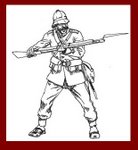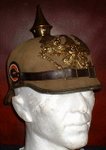Tuesday, March 29, 2016
Rolls Royce conversion from Shouting Into The Void
Here's another conversion of Battlefront's Rolls Royce armoured car, this time to (sort of) the 1916 version, using my 3d-printed conversion set from Shapeways. I didn't do anything about the spare wheels, which should also be spoked, so I probably should add another couple of single wheels to the set. Again, I rather regret being a cheapskate and going for WSF plastic instead of high-resolution FUD resin, even more so than in my other conversion, because the WSF really didn't resolve the wheel spokes much at all, and I had to paint them in, which is not nearly as good.
Rolls Royce Conversion
Friday, March 25, 2016
Martian Miniatures by Chris' Minature Wargaming
To those of you that have been following *Rough Riders On Mars!*, first let me express my gratitude for you interest in that project. Thank you. Let me assure you that Teddy and the gang will have their hands full of intrigues and hostiles before too much longer, probably about chapter 8 or so. The idea of *Rough Riders On Mars!* came to me after I completed the initial draft of my *Edison's Conquest Of Mars* wargame rules. These rules are somewhat based on the novel by Garret P. Serviss of the same title as well as elements from numerous other sword and planet novels. Currently, th... more »
Wednesday, March 2, 2016
The Great Martian War
“What if?” Literary scholars say that question has driven science fiction since time immemorial, and the made-for-TV movie The Great Martian War poses a doozy: What if Mars invaded Earth in 1913?
The Great Martian War isn’t a sci-fi B picture exactly. It airs on History and has been carefully crafted to look, sound and feel like a historical documentary, complete with grainy archival footage, witness testimony from aging survivors and the analysis and deconstruction of present-day experts.
The Great Martian War combines computer-generated images of alien invaders and film footage from the First World War to create the illusion that a Martian invasion actually happened. Think of it as Orson Welles’s The War of the Worlds crossed with Woody Allen’s Zelig, dressed up as a historical documentary, complete with portentous narration (“A century ago these fields were the bloody arena for the most terrible conflict in human history …”) and brooding, “important” background music.
“We were fighting monsters!” an elderly witness recalls, decades later.
Another elderly witness recalls, in a shaking, halting voice, “There was life beyond our planet! It went against everything I was raised to believe … An entire generation of young men, all of them vanished.”
Whether The Great Martian War is for you will depend a lot on your sensibilities. More serious-minded viewers may be offended that actual First World War film footage of a real, bloody conflict involving actual living, breathing people has been manipulated for use in a sci-fi pulp adventure.
Many viewers, though — most, perhaps — will be drawn in by the compelling way The Great Martian War poses its central mystery. It’s silly, sure, yet strangely addictive. It uses every filmmaking trick in the history documentarian’s playbook, from grainy archival footage to the testimony of present-day experts such as “war historian and broadcaster” Duncan Mitchell Myers, who explains how an unexplained explosion in the middle of Germany’s Black Forest triggered a rush to war.
At two hours, The Great Martian War seems repetitive at times, a little like a one-joke comedy stretched too long. It’s cleverly put together, though, with small, welcome touches like war vet Hughie Logan “of Calgary, Canada” — “filmed in 1987,” according to the caption — who recalls that going to war meant leaving loved ones behind at home to ponder his fate on the battlefield.
The Great Martian War isn’t mere pulp entertainment. The centenary commemorations of the First World War — the actual war — are just around the corner. In an indirect, almost offhand way, The Great Martian War seems calculated to appeal to a younger generation raised to believe that historical documentaries are tedious and uninspiring.
The Great Martian War may remind some moviegoers of the 2004 Gwyneth Paltrow film Sky Captain and the World of Tomorrow, which was filmed in sepia tones and set in an alternative 1939. There’s an almost heedless energy to the way The Great Martian War tells its story. It’s a novelty, but an inventive and surprisingly engaging novelty. Provided, that is, one doesn’t take it too seriously. It’s not Ken Burns, after all.
Subscribe to:
Comments (Atom)
































